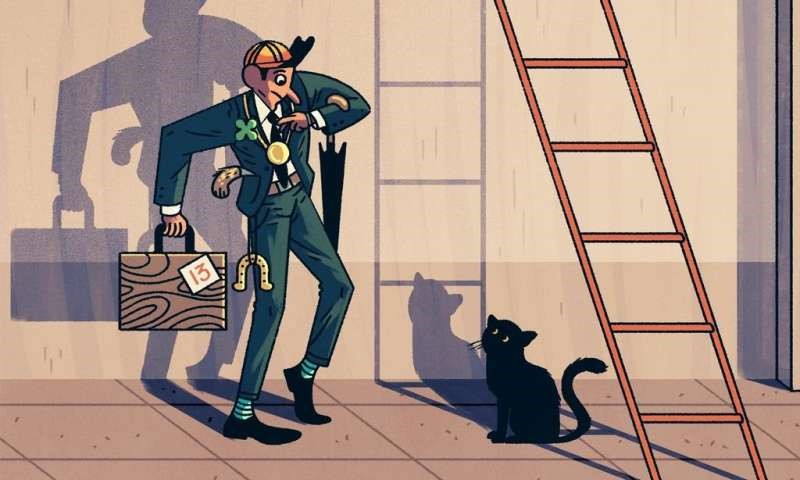Despite its irrationality, everyone has at least one superstition. Superstitions, such as relying on a fortunate pair of trousers or avoiding Friday the 13th, help us make sense of the unpredictable nature of chance and feel more in control of our lives. The unusual cultural origins of some of the world’s most widespread supernatural beliefs are explored here.
10 Most Common Superstitions
Friday the 13th
As we remember that it is once again Friday the 13th, many of us can’t help but experience a twinge of fear. Several high-rise apartment complexes and hotels simply don’t mark their 13th floor out of respect for the popular superstition surrounding the number 13. And you may or may not be aware that there is no 13th row on certain planes.
This myth may have originated from the fact that Jesus was executed on a Friday and that Judas Iscariot, the traitor, was one of the 13 guests at the Last Supper.
The Evil Eye
Have you ever received praise on an item only to have it damaged or destroyed shortly after? The superstitious among us could attribute things to the influence of the evil eye. The Turkish people use an amulet known as a nazar boncuu to protect themselves from the evil eye. The charms often have the shape of an eye and are coloured blue and white (the colour blue is also believed to protect against the evil eye). These talismans may be found just about everywhere, including Greece, Egypt, Iran, Morocco, and Afghanistan.
Walking Under Ladders
Stepping under an open ladder is not only frowned upon but also hazardous since you have no idea what may topple over and land on you; in addition, you never know what might fall on you. According to several mythologies, the shape of an open ladder in the shape of a triangle represents life. It is common belief that if you pass over the triangle, you are playing with the Fates’ hands. You run the risk of upsetting the spirits that have made the triangle their home; some of these specters are known to be particularly malicious.
If you make the mistake of walking beneath a ladder by accident, you may break the curse by interlacing your thumb with your index and middle fingers for at least five seconds or by making the sign of the cross with your hands.
Broken Mirrors
Because of the weird and sometimes unpleasant feeling of seeing one’s own reflection in a mirror, humans have a long history of having a negative connotation with mirrors (especially on a poor hair day). Consider the Greek myth of Narcissus, in which he falls in love with his own image yet his soul is unable to escape since the mirror must eventually crack.
Black Cats
Because of their association with witches, black cats have a negative reputation year-round, particularly around Halloween. The wretched animals are avoided on all days of the year for fear of bad luck, according to the urban legend that says a black cat crossing your path would bring you misfortune. Yet they have company. Crows are often seen negatively in South Korea, and some even believe they are omens of death. Similarly, in the United Kingdom, the raven is considered a bird of ill omen. Legend has it that if the Tower of London ever loses its six ravens, the British throne will fall with them. Even though it’s considered bad luck to sight a single magpie, two or more are considered lucky in Ireland and Scotland.
Trimming Nails at Night
It is considered very unfortunate in Turkey, India, and South Korea to cut one’s fingernails or toenails after dusk. This superstition also exists in South Korea. There are a number of superstitions in Japanese culture that even forecast an early death. People in the past would trim their fingernails using knives and other pointed cutting implements in order to keep them at a manageable length. In the absence of modern medicine, the presence of sharp objects, and darkness, infectious diseases with the potential to cause death may have spread more rapidly.
Toasting with Water
According to a myth that originated in Germany, bringing a glass of water up to one’s mouth is a certain method to expedite that person’s passing. This tale has its roots in ancient Greece, when people thought that the river Lethe supplied food to those who had passed on to the afterlife. Lethe, also known as the river of forgetfulness, was a goddess who was responsible for erasing the spirit’s memory of its life on earth before it was allowed to reach the underworld.
Left Eye Twitching
The twitch is another portentous indicator that suggests the presence of malevolent spirits in your immediate surroundings. Experts believe that a twitching eye might be a sign of stress, particularly if the twitching eye is brought on by problems with the person’s vision, such as eye strain. But, similar to the itching, one should seek medical assistance if the twitching continues after it has stopped.
Four-Leaf Clovers
There are said to be just one in 10,000 odds of finding a clover with four leaves, making its discovery an extremely rare occurrence. When Eve discovered that she had been expelled from the Garden of Eden, the legend says that she took a four-leaf clover with her so that she would always be remembered of her time spent in the paradise garden. These days, seeing a clover with four leaves is considered a sign of both good luck and financial success.
Horseshoes
Another object that is often thought to bring about good fortune is the horseshoe. It’s possible that the horseshoe’s usage as a good luck symbol got its start when people started praying to the pagan moon goddess Diana and giving her a holy vulva.
In the culture of early Europe, iron in particular was thought to be something that could ward off bad spirits, much in the same way as pennies were seen to be both precious and magical. This belief stemmed from the fact that pennies were seen as both valuable and magical. The ancient Romans had the belief that the number seven held a special significance. As a result, horseshoes were often crafted with seven nail holes that corresponded to each other.
Final Thought
Obviously, these are only a handful of the many superstitions that have impacted humans throughout time and space. Strange customs are observed all across the globe to bring about good fortune or ward off ill luck, such as avoiding black cats and collecting four-leaf clovers.
Maybe the term superstitions accurately describes these beliefs. Maybe there’s something to the legends, after all. In any case, I won’t be putting it to the test. I’ll be cautious with mirrors and keep picking up my dropped salt. I suggest you follow my lead.
About Author: The content is written by Maha. She has five years of experience in writing informative articles.












